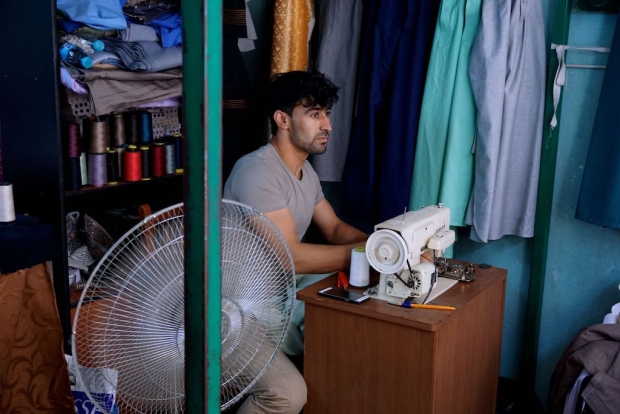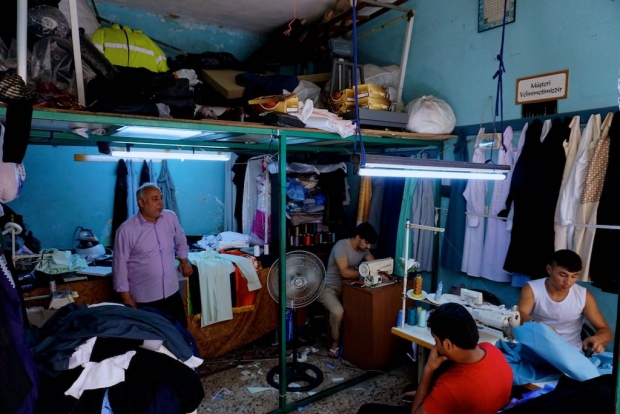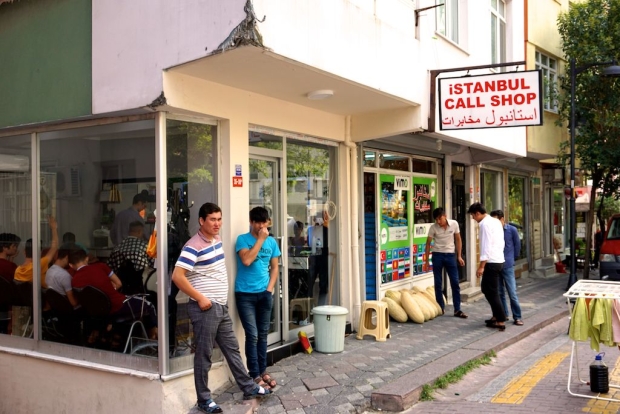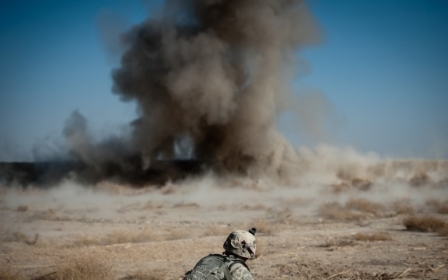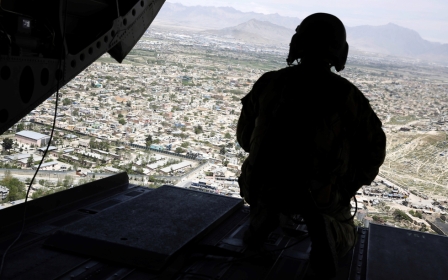'All the roads are blocked': The Afghans stuck in Turkey
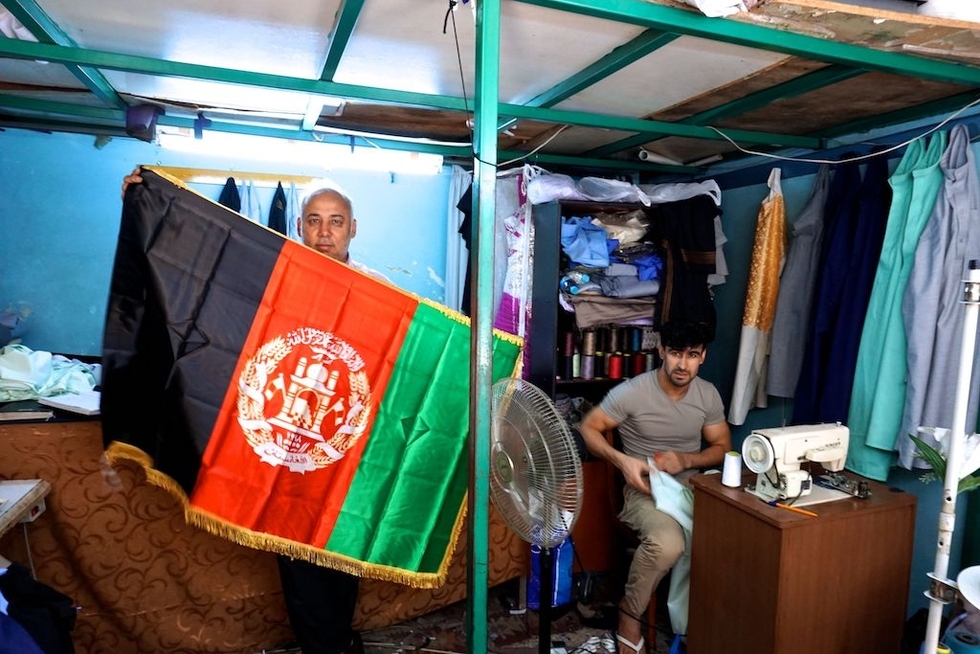
ISTANBUL, Turkey - A coat of arms in a triptych of black, red and green, Aziz Beyler stitches the Afghan flag to a traditional shalwar khameez outfit at his shop in the Zeytinburnu neighbourhood of Istanbul.
Zeytinburnu is home to ethnic Uzbeks, Tajiks, Turkmens, Uyghurs, and the city's Afghans. Store-front signs in Dari display apartments for rent, grocery stores, restaurants, and Beyler’s tailor shop. Afghans come to him for the sartorial comforts of home: the pair of loose trousers and a collared, long-sleeved top hitting the knees which make up the shalwar khameez.
Beyler claims to be the only tailor in a city of nearly 15 million people who can measure, cut and sew traditional Afghan clothing. He charges $50 for a single outfit, which for some can be rent money, even half a month's salary.
"I have about 500 customers and they come from all over, not just Istanbul. Konya. Eskisehir," said Beyler, listing various Turkish cities. When it comes to shalwar khameez, a Turkmen tailor next to him agrees: "There's no one else who makes them."
Beyler has been running his tailoring business for five years, having lived in Turkey for twenty-five. He's a Turkish citizen, unlike many of his customers who are undocumented in the country. One of Beyler's regulars, Mustafa, 28, has been trying to obtain a residence permit so that he can legally stay in Turkey and travel to Afghanistan to see his family.
"I've been living here for four years. I came here illegally by crossing the border. I'm not able to go to Afghanistan. If I go, that's it. I can't come back," he said.
'All the roads are blocked'
According to the UNHCR, 120,529 Afghan refugees have sought asylum as of January 2017. Advocates consider that number to be a drop in the ocean considering the thousands that have already crossed into Turkey.
Dogus Simsek, a post-doctoral fellow at Istanbul's Koc University Migration Research Center, mentioned in an email to Middle East Eye that asylum applications from Afghans have been suspended since 2013 due to the large number of cases. The UNHCR's Turkish office resettles only the most vulnerable applicants.
Unlike Syrians, who are granted temporary protection status until the Syrian civil war ends, Afghan migrants are not eligible for assistance from the Turkish government. For instance, Syrians legally have access to healthcare facilities, education, social assistance, and the labour market, although human rights groups maintain that many fall through the cracks in the system.
Anybody who suggests that Afghans are leaving for purely economic reasons clearly hasn't lived in Kabul. Those claims are incredibly cynical
- Liza Schuster, City University
Afghan migrants who do not have active cases with the UNHCR, however, are left to fend for themselves. They often resort to backbreaking work like scrap collecting on the streets of Istanbul, factory jobs in substandard conditions, even illicit activities such as human and drug smuggling.
Facing economic exploitation in Turkey and a backlogged asylum system, many Afghans choose to slip into Bulgaria or Greece, and onwards to countries like Germany, Switzerland or France. There, they hope to claim asylum and have a chance to reunite with their families.
"All the roads are blocked," said Ali, 15, about his thwarted plans to make it to Europe. A deal struck between Turkey and the European Union in March last year, when Turkey agreed to take back rejected asylum seekers in exchange for those accepted, has made it difficult for Afghans. They are often considered economic migrants instead of refugees by EU member states.
"Anybody who suggests that Afghans are leaving for purely economic reasons clearly hasn't lived in Kabul. Those claims are incredibly cynical," said Liza Schuster, a Kabul-based sociologist affiliated with City University in London.
"You can't untangle the security situation from the economic situation."
For 16 years, the Afghan government has been locked in a deadly struggle for control of the country against the Taliban. In May, a truck bomb struck Kabul, killing 92 people and injuring 500. The UN called it "the deadliest incident recorded" since the US intervention in Afghanistan toppled the Taliban from leadership.
Last week, IS took responsibility for the bombing of a Shia mosque in the capital, which killed at least 20 people. The Trump administration has recently approved an additional 4,000 American troops to join an existing force of 8,000, part of a war effort with seemingly no end in sight.
Schuster said that when a person dies or gets injured from an attack, the whole family could lose their entire source of income.
"Unemployment is about 40%, some reports put it at 60% for the workforce in general," she said. "So what you see as a result of that is large extended families, like 15 people, dependent on a single person."
'I have no money. Nothing'
For Ali, the complete lack of security in the country, coupled with a sick father and several younger siblings to support, made life in Afghanistan untenable.
He paid a smuggler to make the overland journey to Turkey. He started from Quetta in Pakistan, and passed through the country's lawless Balochistan province to reach Iran. From there, he crossed the mountainous Turkish-Iranian border and travelled through Anatolia to get to Istanbul. In Zeytinburnu, he waits on the edge of Europe.
Eight months later, Ali has trouble finding steady work; he is helping out at an Afghan restaurant near the tailor shop. He tried a factory job, but the boss failed to pay his workers their promised wages. Ali has no passport, no documents, not even a mobile phone - it was stolen by a thief who broke into his apartment.
With no means of communication and identifying papers, registering with the UNHCR is a long shot for him. His only hope was to cross into Europe. "I'll go when the ways open up again. It's really expensive now. I have no money. Nothing," he said.
"In 2015, it wasn't that expensive," said Schuster. "These controls make it more lucrative for smugglers because the route is more dangerous."
Schuster said that with any kind of policy, whether it's the EU-Turkey deal or Hungary closing its borders, the consequence is a "temporary dip" in the numbers, but then people try Italy instead of Greece, which is more difficult. The costs become prohibitively high, and the incentives for smuggling increase.
"You see a lot of Afghans being pushed back from Greece and Bulgaria, so they become stuck in Turkey with no money. It makes them vulnerable to exploitation," she said.
For many refugees, staying in Turkey has its perils. In May, tensions between Turkish residents and Syrians and Afghans in Istanbul escalated, with one Turkish man killed, leading to protests by locals that were quelled by riot police using tear gas. Three-hundred people of Syrian and Afghan origin were detained and relocated to different parts of the country.
"It was much easier back then," said Aziz Beyler, who arrived in Turkey nearly a quarter century ago. Many of his customers, like Mustafa, have a much harder time, unable to see their families, with no choice but to stay in Istanbul to support them. In this limbo state, Mustafa is left to carry Afghanistan in his heart, and on his shalwar khameez.
"When I work, I wear pants and shirts. When I'm off, I want to feel free. I want to wear Afghan clothes just like I did back home."
New MEE newsletter: Jerusalem Dispatch
Sign up to get the latest insights and analysis on Israel-Palestine, alongside Turkey Unpacked and other MEE newsletters
Middle East Eye delivers independent and unrivalled coverage and analysis of the Middle East, North Africa and beyond. To learn more about republishing this content and the associated fees, please fill out this form. More about MEE can be found here.


